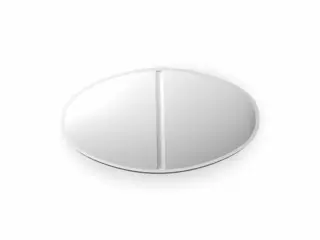Buy Theophylline Online from Trusted UK Pharmacy
| Package | Dosage | Price | Price per Dose | |
|---|---|---|---|---|
| Dosage: 400mg | ||||
| 360 pill | 400mg | £263.36 | £0.73 | |
| 180 pill | 400mg | £142.99 | £0.79 | |
| 120 pill | 400mg | £104.93 | £0.87 | |
| 90 pill | 400mg | £87.44 | £0.97 | |
| 60 pill | 400mg | £65.83 | £1.10 | |
| 30 pill | 400mg | £40.11 | £1.35 | |

Theophylline Description
Overview of Theophylline
Theophylline is a medication commonly used to treat respiratory conditions such as asthma, chronic bronchitis, and emphysema. It belongs to the class of drugs known as bronchodilators, which work by relaxing the muscles around the airways. This relaxation helps to open up the air passages, making breathing easier for patients experiencing airway constriction. The drug has been in use for many decades and remains an important option in managing obstructive airway diseases.
How Theophylline Works
Theophylline exerts its effect by inhibiting the enzyme phosphodiesterase, leading to increased levels of cyclic AMP within airway smooth muscle cells. Elevated cyclic AMP promotes muscle relaxation, thereby dilating the bronchi and alleviating symptoms such as wheezing, shortness of breath, and coughing. Additionally, Theophylline has mild anti-inflammatory properties, which can help reduce airway inflammation over time. Its dual action on airway muscles and inflammation makes it a versatile medication in respiratory therapy.
Usage and Dosage
Theophylline is typically administered in oral form, including tablets, capsules, or liquids. The dosage depends on the patient’s age, weight, severity of the condition, and individual response to the medication. It is important for patients to follow their healthcare provider's instructions precisely. Regular blood tests are often required to monitor Theophylline levels, as the drug has a narrow therapeutic window. Too high a level can lead to toxicity, while too low a level may be ineffective. Adjustments in dosage are made based on these blood concentrations to ensure safety and efficacy.
Benefits and Effectiveness
Many patients find Theophylline effective in controlling symptoms of chronic respiratory diseases. It not only helps prevent asthma attacks but also improves overall lung function. Some clinicians prefer it for patients who do not respond well to other bronchodilators or inhaled therapies. Since oral administration is convenient, it offers an alternative for individuals who have difficulty using inhalers. However, its use requires ongoing monitoring due to potential side effects and interactions with other medications.
Potential Side Effects
While Theophylline can be highly beneficial, it is associated with a range of possible side effects. Common adverse reactions include nausea, vomiting, headaches, irritability, and sleep disturbances. More serious but less frequent side effects involve heart palpitations, rapid breathing, or seizures. Because of the risk of toxicity, patients should be vigilant for symptoms such as severe nausea, dizziness, or irregular heartbeat. Regular therapeutic drug monitoring is essential to avoid overdose and toxic effects.
Precautions and Interactions
Certain medical conditions and other medications can influence Theophylline levels. Conditions like liver disease, heart problems, or gastrointestinal issues require careful consideration before starting therapy. Several drugs, including antibiotics, certain antidepressants, and other respiratory drugs, can interact with Theophylline, either increasing its levels and risk of toxicity or decreasing its effectiveness. Patients should disclose all their medications to their healthcare provider to avoid harmful interactions. Smoking can also affect Theophylline metabolism, often necessitating dosage adjustments.
Conclusion
Theophylline remains a useful medication in managing respiratory conditions, particularly when other treatments are insufficient. Its ability to improve airflow and reduce symptoms makes it a valuable option for many patients. However, due to its potential side effects and narrow therapeutic range, careful monitoring and professional guidance are essential. When used appropriately, Theophylline can significantly enhance quality of life for individuals with chronic airway diseases.
See Also


